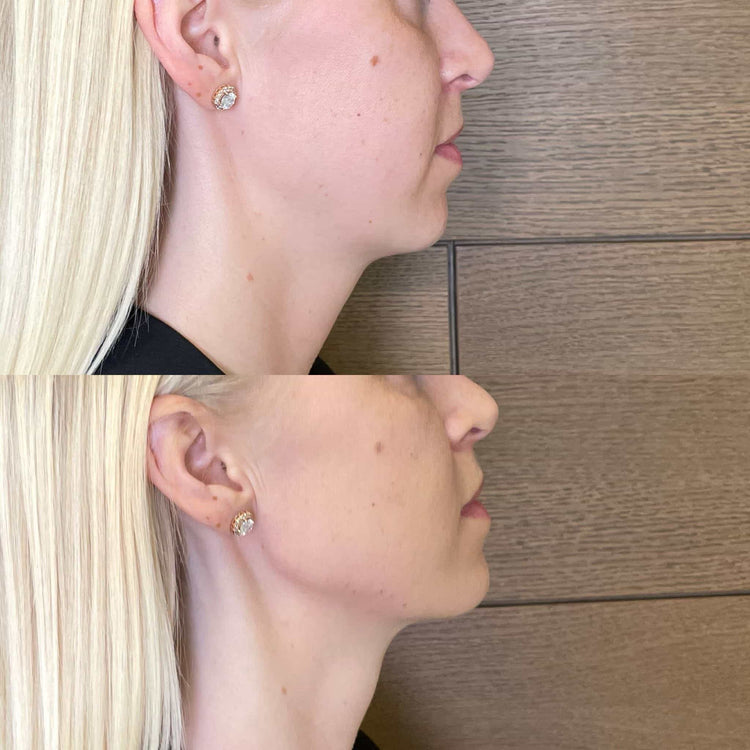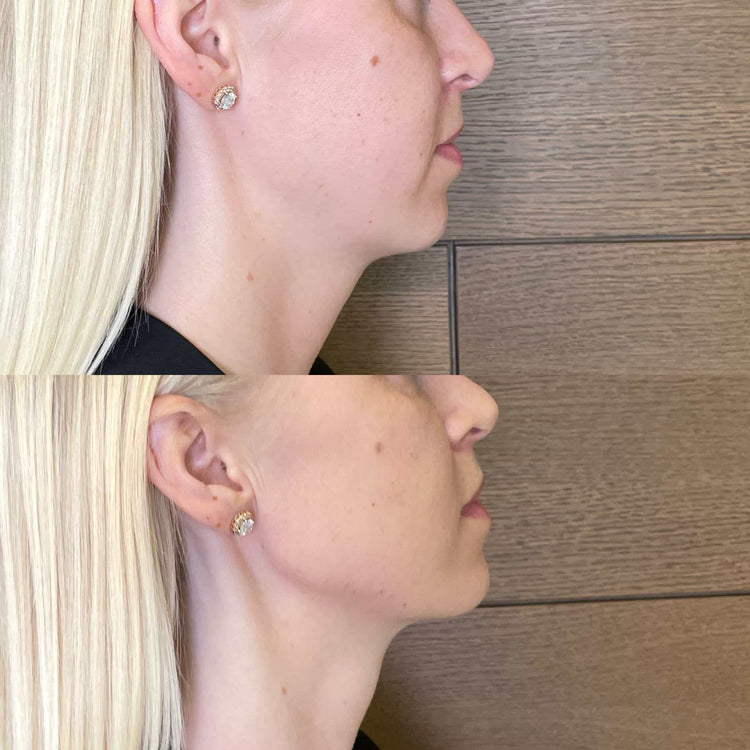Managing Post-Procedure Swelling After Jaw Fillers
Jaw fillers can effectively enhance facial contours and achieve a more defined jawline, but it’s essential to understand the potential for swelling following the procedure. Managing this swelling appropriately is crucial for ensuring optimal results and minimizing discomfort. This guide will provide practical tips and advice on how to effectively manage post-procedure swelling after receiving jaw fillers in Kingston Upon Thames.
Understanding Swelling
Swelling is a normal physiological response to any invasive procedure, including jaw filler injections. During the injection process, tiny punctures are made in the skin, and the introduced filler disrupts the surrounding tissues. This disruption triggers an inflammatory response, leading to fluid accumulation and swelling. Swelling typically peaks within 24-72 hours after the procedure and gradually subsides over the following days or weeks.
Ice Packs and Cold Compresses
Ice packs and cold compresses are effective methods for managing post-procedure swelling after jaw fillers. Applying ice to the treated area can help constrict blood vessels, reducing inflammation and fluid accumulation. It’s recommended to wrap ice in a thin towel and apply it to the jawline for 15-20 minutes at a time, several times a day.
It is important to avoid direct contact between the ice and the skin as this can cause irritation or frostbite. Additionally, remember to take breaks between applications to allow the skin to warm up slightly.
Elevation
Elevation of the head while sleeping can help minimize swelling in the jaw area. Sleeping with an extra pillow under your head helps drain fluid away from the treated area and can promote a faster recovery process.
Over-the-counter pain relievers, such as ibuprofen or acetaminophen, can help manage any discomfort or pain associated with swelling. It’s important to follow the recommended dosage instructions on the medication label.
Medications
Swelling is a normal response after jaw filler injections in Kingston Upon Thames. To minimize it, ice packs are helpful. Apply them for 15-20 minutes at a time, several times daily, wrapped in a thin towel to avoid skin irritation.
Elevating the head while sleeping can also reduce swelling. Use an extra pillow to elevate your head and aid fluid drainage.
Over-the-counter pain relievers like ibuprofen or acetaminophen can manage discomfort. Always follow the dosage instructions on the medication label.
Pain Relievers
Swelling after jaw filler injections is normal, usually peaking within 24-72 hours and gradually subsiding over the following days or weeks.
Applying ice packs to the treated area for 15-20 minutes at a time, several times daily, can help reduce inflammation and fluid accumulation. Wrap the ice in a thin towel to prevent direct skin contact.
Sleeping with your head elevated using an extra pillow can also minimize swelling by promoting fluid drainage away from the treated area.
Over-the-counter pain relievers such as ibuprofen or acetaminophen can help manage any discomfort. Always follow the recommended dosage instructions on the medication label.
Antihistamines
Managing post-procedure swelling after jaw fillers involves several strategies to minimize discomfort and promote healing.
Ice packs are your allies in this process. Applying them to the treated area for 15-20 minutes at a time, several times daily, can help constrict blood vessels, reducing inflammation and fluid buildup. Remember to wrap the ice in a thin towel to avoid direct skin contact and potential irritation.
Another helpful tip is elevating your head while sleeping. Use an extra pillow to raise your head slightly, which encourages fluid drainage away from the jaw area.
Over-the-counter pain relievers like ibuprofen or acetaminophen can also be effective in managing any discomfort associated with swelling. Be sure to follow the recommended dosage instructions on the medication label.
In addition to these measures, antihistamines may help reduce inflammation and swelling by blocking the action of histamine, a chemical involved in the inflammatory response.
Hydration
Swelling is a common and normal part of the healing process after jaw filler injections. It typically peaks within 24-72 hours and gradually subsides over several days to weeks.
Ice packs are your primary weapon against swelling. Applying them to the treated area for 15-20 minutes at a time, several times a day can help minimize inflammation and fluid buildup. Be sure to wrap the ice in a thin towel to avoid direct skin contact and potential irritation.

Elevating your head while sleeping can also be beneficial. Using an extra pillow to raise your head slightly encourages fluid drainage away from the jaw area, which can help speed up the recovery process.
Over-the-counter pain relievers like ibuprofen or acetaminophen can effectively manage any discomfort or pain associated with swelling. Always follow the recommended dosage instructions on the medication label.
Hydration plays a crucial role in managing post-procedure swelling. Drinking plenty of water helps thin the blood, which can aid in reducing fluid buildup and promoting lymphatic drainage. Aim to consume at least eight glasses of water per day following your procedure.
Staying well hydrated also supports overall healing and recovery.
Diet Considerations
Swelling is a normal part of the healing process after jaw filler injections in Kingston Upon Thames.
- Apply ice packs to the treated area for 15-20 minutes at a time, several times daily. This can help constrict blood vessels, reducing inflammation and fluid buildup. Be sure to wrap the ice in a thin towel to avoid direct skin contact and potential irritation.
- Elevate your head while sleeping by using an extra pillow. This encourages fluid drainage away from the jaw area, which can help speed up the recovery process.
- Over-the-counter pain relievers like ibuprofen or acetaminophen can effectively manage any discomfort or pain associated with swelling. Always follow the recommended dosage instructions on the medication label.
In addition to these measures, hydration is crucial for managing post-procedure swelling. Drinking plenty of water helps thin the blood, which can aid in reducing fluid buildup and promoting lymphatic drainage. Aim to consume at least eight glasses of water per day following your procedure.

Avoidance of Certain Activities
Jaw fillers offer an effective way to enhance facial contours and achieve a more defined jawline. However, swelling is a normal part of the recovery process after this procedure. Understanding how to manage this swelling is essential for ensuring optimal results and minimizing discomfort.
- Ice Application: Applying ice packs to the treated area can significantly reduce swelling. Wrap ice in a thin towel and apply it for 15-20 minutes at a time, several times daily. This helps constrict blood vessels and minimize fluid accumulation.
- Elevation: Elevating your head while sleeping can also help drain fluid away from the jaw area. Use an extra pillow to elevate your head slightly throughout the night.
- Pain Relief: Over-the-counter pain relievers such as ibuprofen or acetaminophen can effectively manage discomfort associated with swelling. Always adhere to the recommended dosage instructions on the medication label.
Avoid strenuous activity and exercises that put excessive pressure on the jaw area for at least a few days after your procedure. This allows the filler to settle and minimizes the risk of complications or further swelling.
Limit your intake of alcohol and caffeine, as these substances can dehydrate you and potentially exacerbate swelling.
Strenuous Exercise
Managing post-procedure swelling after jaw fillers is crucial for a smooth recovery. Ice packs are your first line of defense, reducing inflammation by constricting blood vessels. Apply them to the treated area for 15-20 minutes at a time, several times a day, always wrapped in a thin towel to avoid skin irritation.
Elevating your head while sleeping helps drain fluid away from the jaw, minimizing swelling. An extra pillow can achieve this comfortably.
Over-the-counter pain relievers like ibuprofen or acetaminophen can help manage any discomfort associated with swelling. Always follow dosage instructions on the medication label.
It’s important to avoid strenuous exercise for at least a few days after your procedure. This allows the filler to settle and minimizes strain on the treated area, reducing the risk of complications or increased swelling.
Limit alcohol and caffeine intake as they can dehydrate you, potentially worsening swelling.
Alcohol Consumption
Managing post-procedure swelling after jaw fillers is crucial for optimal results and a comfortable recovery. Swelling is a normal response to the procedure as your body heals.
Ice packs are your primary tool in reducing swelling. Apply them to the treated area for 15-20 minutes at a time, several times daily. Remember to wrap the ice in a thin towel to protect your skin from direct contact.
Elevating your head while sleeping can also help drain fluid away from the jaw area and minimize swelling. Use an extra pillow to elevate your head slightly.
Over-the-counter pain relievers like ibuprofen or acetaminophen can effectively manage discomfort associated with swelling. Always follow the recommended dosage instructions on the medication label.
During the healing process, it’s important to avoid strenuous activities and exercises that put pressure on the jaw area. This allows the filler to settle properly and reduces the risk of complications.
Alcohol consumption can dehydrate you and may exacerbate swelling, so it’s best to limit or avoid alcohol intake for a few days following your procedure.
Smoking
Managing post-procedure swelling after jaw fillers in Kingston Upon Thames is essential for optimal results. Swelling is a normal physiological response to the procedure as your body adjusts to the filler. Here are some tips to help minimize swelling:
Ice packs applied to the treated area for 15-20 minutes at a time, several times daily, can significantly reduce inflammation and fluid buildup. Remember to wrap the ice in a thin towel to protect your skin.
Elevating your head while sleeping using an extra pillow can promote fluid drainage away from the jaw area, helping to minimize swelling.
Over-the-counter pain relievers like ibuprofen or acetaminophen can effectively manage any discomfort associated with swelling. Always adhere to the recommended dosage instructions on the medication label.
Avoid strenuous activities and exercises that put pressure on the jaw area for at least a few days following the procedure. This allows the filler to settle properly and minimizes strain on the treated area.
Smoking can significantly hinder your recovery and increase swelling after any cosmetic procedure, including jaw fillers. Nicotine restricts blood flow and delays healing, potentially leading to complications such as infection and poor aesthetic outcomes.
Compression Garments
Managing post-procedure swelling after jaw fillers in Kingston Upon Thames involves a combination of techniques to minimize discomfort and promote healing. Compression garments can be a helpful tool in this process.
Compression garments, often made from elastic materials, apply gentle pressure to the treated area, which can help reduce swelling by promoting lymphatic drainage and constricting blood vessels. These garments are typically worn for several days after the procedure as directed by your practitioner.
It’s important to note that compression garments should fit snugly but not too tightly. Wearing them too tightly can restrict blood flow and cause discomfort.
Always follow your practitioner’s instructions regarding wearing compression garments, including the duration of wear and any specific recommendations they may have.
Follow-up Appointments
Managing post-procedure swelling after jaw fillers in Kingston Upon Thames involves several strategies to minimize discomfort and promote healing.
- Ice Application: Apply ice packs to the treated area for 15-20 minutes at a time, several times daily. This helps constrict blood vessels and minimize fluid buildup. Remember to wrap the ice in a thin towel to avoid direct contact with your skin.
- Elevation: Elevate your head while sleeping by using an extra pillow. This encourages fluid drainage away from the jaw area, reducing swelling.
- Pain Relief: Over-the-counter pain relievers like ibuprofen or acetaminophen can effectively manage discomfort associated with swelling. Always adhere to the recommended dosage instructions on the medication label.
- Compression Garments: Wearing compression garments as directed by your practitioner can help reduce swelling by promoting lymphatic drainage and constricting blood vessels. Ensure they fit snugly but not too tightly.
Follow-up appointments are an important part of ensuring the best possible outcome after receiving jaw fillers in Kingston Upon Thames.
- Initial Follow-Up: You’ll likely have a follow-up appointment with your practitioner within a few days to a week after the procedure. This allows them to assess your healing progress, address any concerns you may have, and make adjustments if needed.
- Subsequent Appointments: Depending on your individual case and the desired results, you may have additional follow-up appointments scheduled over the following weeks or months. These appointments allow for ongoing assessment of the filler’s placement, any potential irregularities, and to address any lingering swelling or concerns.
Don’t hesitate to contact your practitioner if you experience any unusual symptoms or have questions about your recovery process between scheduled appointments.
- Alluzience Longer Lasting Botox Near Shirley, Surrey - September 3, 2025
- How Soon After Lip Filler Can You Wear Lipstick - September 3, 2025
- How Sculptra Can Reverse The Signs Of Aging In Surrey - September 1, 2025
